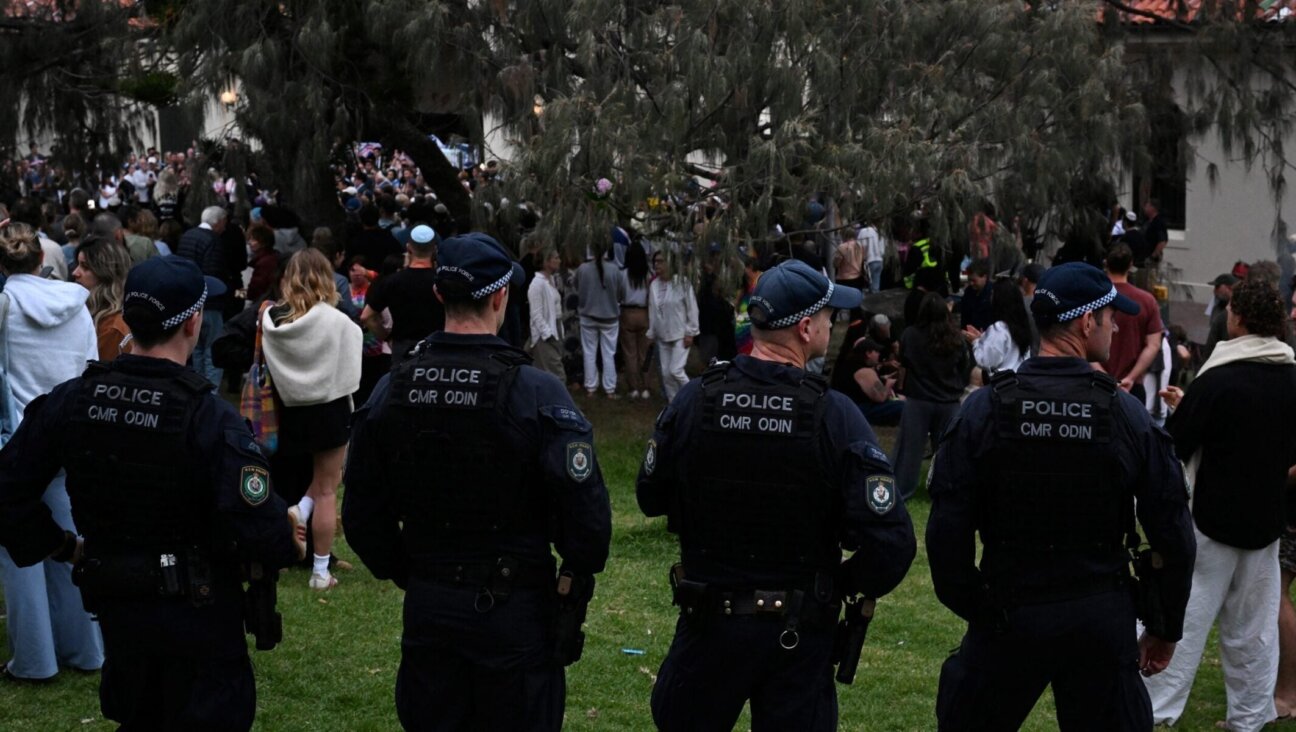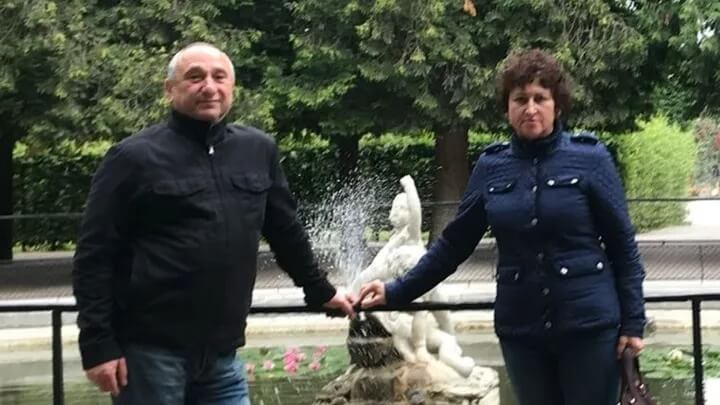Emotions Run High at Yom HaShoah Event

Graphic by Angelie Zaslavsky
FILM STAR LENA OLIN HONORED AT AMERICAN-SCANDINAVIAN GALA
“Did you ever meet Isaac Bashevis Singer?” I asked film star Lena Olin at The American-Scandinavian Foundation’s gala, held April 7 at the Pierre Hotel. Olin and her husband, filmmaker Lasse Hallström, were honored at the event. “No,” Olin said, “but I was told that he was happy with my portrayal.” Our chat was in regard to the 1989 film “Enemies, a Love Story,” based on Singer’s novel à clef in which she portrays Masha, the seductive married lover of the also married Herman Broder, portrayed by Ron Silver. Olin fan Rabbi Arthur Schneier was beaming about the forthcoming (April 18) visit to Park East Synagogue, where he serves, by Pope Benedict XVI. A master networker, Schneier, president of the Appeal of Conscience Foundation, shmoozed with ASF’s president ,Edward Gallagher, and with honorees Jorma Olilla, chairman and CEO of Nokia — a Finnish company that boasts nine design studios around the world — and Gro Harlem Brundtland, the first woman to hold the post of prime minister of Norway.
Hallström (whose first international film of note was the Academy Award-nominated 1985 Swedish film “My Life as a Dog,” and who is acclaimed for such films as “The Cider House Rules,” “Chocolat,” “What’s Eating Gilbert Grape” and “The Hoax”) thanked “the love of my life, Lena, without whom there would have been no American adventure.” Among the filmmakers who influenced him, Hallström cited “Charlie Chaplin, a man with an international language; John Cassavetes; Milos Forman and, of course, Woody Allen.” Hallström and Olin (who made her international film debut in 1988 in “The Unbearable Lightness of Being”) accepted the foundation’s Cultural Award from Bard Bunaes and Lena Kaplan.
In her April 13 New York Times Magazine article, “Can the Cellphone Help End Global Poverty?” Sara Corbett notes: “Nokia [is among those trying] to design a cellphone that will sell to essentially the only people left on earth who don’t yet have one… who are illiterate, making $4 per day or less.… [Nokia’s] research team has spoken to rickshaw drivers, prostitutes, shopkeepers, day laborers and farmers, and all of them say… their income gets a big boost when they have access to a cellphone.” In addition to heading Nokia, Ollila is chairman of Royal Dutch Shell, board member of Ford Motor Company and chairman of the European Round Table of Industrialists
Over the years, The American-Scandinavian Foundation, an educational and cultural link between the United States and the five Scandinavian countries — Denmark, Finland, Iceland, Norway and Sweden (and headquartered in Scandinavia House on Park Avenue) — has presented exceptional forums and exhibitions showcasing Scandinavia’s Jewish communities in historical context before, during and after the Holocaust.
REMEMBERING ONE’S ROOTS AT MUSEUM OF JEWISH HERITAGE GALA
“There is power in a place,” said David Marwell, director of the Museum of Jewish Heritage -A Living Memorial to the Holocaust at the museum’s April 14 annual Heritage Dinner, apropos the institution’s positioning opposite the Statue of Liberty. Honoree Peter Kalikow, president of real estate firm HJ Kalikow & Co., told how at the end of World War II, Dwight D. Eisenhower, the Supreme Commander of the European Theatre of Operations, “insisted that the press visit the death camps so the world would see what the Nazis had done.” Kalikow recalled that Eisenhower said, “In 20, 30 years, some so-and-so will either try to diminish these crimes or try to deny [they ever happened].” A cottage industry of Holocaust deniers has since developed.” Former New York City mayor Ed Koch was adamant: “Any time anyone says it never happened, let them come here [to the museum] and see.” Also honored was Bruce Ratner, chairman and CEO of Forest City Ratner Companies. Ratner’s family-history trajectory reads like a classic Ellis Island-Forverts-only-in-America saga.
“I was born in January 1945, the week that Auschwitz was liberated,” said Ratner, who serves on the museum’s building committee. His company’s projects include the Madame Tussauds/AMC Theater entertainment complex on 42nd Street and the new Manhattan headquarters for The New York Times.
“On my father’s side of the family, 45 relatives are known to have died in the Holocaust.… My father was born in Bialystok and came to this country before the war, with his eight brothers and sisters. He spoke broken English punctuated with Yiddish. My mother’s family was also from Poland, and while she was born here, most of her 11 siblings came from Eastern Europe to Cleveland, Ohio.… We were raised conservative Orthodox, strictly kosher at home but enjoying the American experience when eating out.” He remembered “putting money in the pushki [box] for Israel, lighting candles, listening to my parents speak Yiddish at the Shabbos dinner, speaking politics in the McCarthy era, talking about Brown vs. Board of Education.”
“This museum is the most important philanthropic activity I am involved with,” Ratner continued. “As the exhibits demonstrate, we have always emphasized learning. My father only had a fourth grade education, my mother [went to] vocational school. While other kids were in the playground, I was playing “Oyfn Pripetchok” for my father on the clarinet. Our bookshelves were filled not with Faulkner or Dickens but with books about the partisan Hannah Senesh or a book I read over and over again, called, “From Moses to Einstein: They are all Jews.” After the war, my father sponsored many survivors, signing hundreds of affidavits for jobs and employment.… My mother would remind us to ‘never forget!’
“This Museum of Jewish Heritage speaks to all of us.… It continues to speak to those who went before us, those not here to tell as I have told. Sometimes I stand in the [the museum’s special] Garden upstairs, look out and see the Ellis Island of my parents.”
Ratner mused, “I feel so fortunate to be here at this time.… Like the trees rooted in the rocks in the Garden, this place is rooted in me and I am rooted in this place. Shoyn genug. That’s enough.”
A PROFOUNDLY MOVING YOM HASHOAH EVENT AT TEMPLE EMANU-EL
“No politicians here! Get out! Get out!” shrieked the frail, white-haired Holocaust survivor as New York Senator Charles Schumer mounted the podium at the May 4 Annual Gathering of Remembrance/Holocaust — Yom HaShoah event at Manhattan’s Temple Emanu-El. Schumer waited, as did the hundreds sitting silently in the pews, as attempts to calm him failed. How can you evict a survivor for whom some memory triggered an emotional crisis? Before the ranter — still resisting — was gently led out, Schumer stated, loud and clear, “If more politicians had spoken up in the 1930s, there would have been no Holocaust.” The loud applause was the response. Event chairs Rita Lerner and Ann Oster, both of them daughters of Holocaust survivors, led off a program that included a procession of 36 female survivors — dressed in black — who lit memorial candles; Cantor Joseph Malovany sang the Israeli and American national anthems and a wrenching interpretation of “El Mole Rachamin,” and the 60-plus strong HaZamir: International Jewish High School Choir, under the baton of director Matthew Lazar, sang “Eli Eli” in Hebrew and “Jugnt Hymn,” (“Youth Hymn”) in Yiddish.
It was an afternoon of pain carried forward, that though we Jews and survivors strive to remember, as the survivor ranks diminish, the world may forget. Holocaust survivor Sam Bloch began in Yiddish then segued into English as he cited “20 centuries of a history of survival — inquisition, pogroms, crematoriums… the burning of books led to the burning of synagogues, then the burning of people.” Lauding “the U.S. military who liberated us,” he vowed, “As long as we live, our children will not stop telling our story of survival, our hopes, a new spirit to renew their lives.”
“The Holocaust is part of our and Israel’s DNA,” declared Israel’s consul general, Meir Shalev, who described the past week as “very emotional for Israelis and Jews,” coinciding as it did with the 65th anniversary of the Warsaw Ghetto uprising and the 60th anniversary of the birth of the State of Israel. He also touched on the issue of Holocaust denial and alluded to George Santayana’s maxim: “Those who do not remember history are doomed to repeat it.” Also on the program were David Posner, senior rabbi of Congregation Emanu-El and Marwell. Holocaust survivor Herman Schwarz led the audience in the Kaddish, and young Jennifer Klein, who represented the “third generation,” vowed that her 9-month-old twins will be “the fourth generation” and “will be taught never to forget.”
















